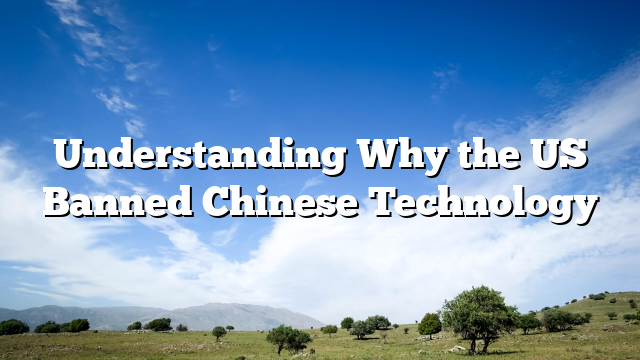Understanding the Political and Security Concerns That Led to the United States Government’s Decision to Ban Chinese Technology
The government of the United States has adopted a position against technology businesses based in China, claiming worries about the country’s national security as well as political difficulties. The restriction placed on these colossal names in the computer industry has caused debates and conversations all around the globe, with many individuals questioning the logic behind such a measure. In this essay, we will discuss the top ten reasons why the United States has placed an embargo on technology from China.
Threats to National Security: The United States government’s top priority is mitigating the risk to the nation’s security that is presented by enterprises in China’s technology sector. It is thought that many of these corporations have strong links to the Chinese government, and it is also suspected that these companies are exchanging critical information with the Chinese government.
Espionage in Cyberspace: The government of the United States has accused China of conducting cyber espionage utilizing the country’s various technological corporations. The United States of America thinks that Chinese technology firms are participating in hacking into the computer networks of US corporations and government agencies in order to obtain critical information.
Competition: The United States of America sees Chinese enterprises in the technology sector as a danger to its own domestic technology industry. The United States government is worried that these corporations are engaging in unethical business methods, such as stealing intellectual property and receiving subsidies, in order to obtain a competitive advantage over American technology enterprises.
Concerns Regarding Human Rights: The government of the United States is likewise worried about the state of human rights in China, especially with respect to how its people are treated and how much censorship there is on the internet.
Espionage for Economic Gain: The government of the United States has accused China of utilizing its tech businesses to engage in economic espionage, namely the theft of trade secrets and intellectual property.
Operations of Influence: The government of the United States is worried that Chinese technology businesses are being used to distribute propaganda and conduct influence operations with the goal of affecting public opinion and decision-making.
Strategic Interests: The United States places a high priority on the development of its technology sector as a means of advancing its strategic goals, which include ensuring both economic and military stability. The United States government is of the opinion that it would be detrimental to the country’s national security to allow Chinese technology businesses to operate inside its borders.
Privacy Concerns: The United States government is worried about the acquisition and use of personal data by Chinese technology firms, in particular as it relates to the collecting of customers’ personal information.
Huawei’s Involvement in 5G: Concerns Over Huawei’s Participation in the Development of 5G Technological The United States government has expressed special worry regarding the participation of Huawei, one of the major technology corporations in China, in the development of 5G technology. The government of the United States is concerned that the participation of Huawei in the development of 5G might endanger national security.
Relationships with the Chinese Communist Party: The relationship between the Chinese Communist Party and a large number of Chinese technology enterprises is a source of worry for the United States administration. The government of the United States feels that the strong relationships between these corporations and the Chinese government make it impossible to differentiate between the acts taken by each entity.
In summing up, the United States’ prohibition on the importation of technology from China may be attributed to a confluence of national security, political, and economic concerns. It is the opinion of the government of the United States that these businesses constitute a danger to the country’s national security, and that allowing them to conduct business within the country’s borders would be detrimental to the country’s strategic interests and put the domestic technology industry in jeopardy.

Darren Trumbler is a versatile content writer specializing in B2B technology, marketing strategies, and wellness. With a knack for breaking down complex topics into engaging, easy-to-understand narratives, Darren helps businesses communicate effectively with their audiences.
Over the years, Darren has crafted high-impact content for diverse industries, from tech startups to established enterprises, focusing on thought leadership articles, blog posts, and marketing collateral that drive results. Beyond his professional expertise, he is passionate about wellness and enjoys writing about strategies for achieving balance in work and life.
When he’s not creating compelling content, Darren can be found exploring the latest tech innovations, reading up on marketing trends, or advocating for a healthier lifestyle.
